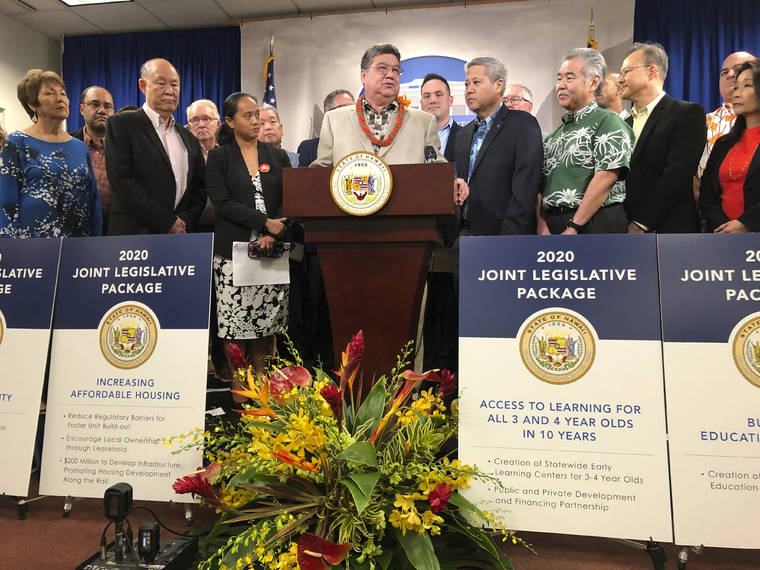HONOLULU — Hawaii House and Senate leaders, with the support of Gov. David Ige, on Tuesday unveiled a long list of measures to boost housing, early childhood education and incomes with a particular focus on alleviating the struggles of Hawaii’s working families and poor.
It’s the first joint bill package from the two legislative chambers since 2004.
“The House and Senate members have been working really hard over the interim to address an issue that is important to all of us — that is the cost of living in Hawaii,” House Speaker Scott Saiki said at a news conference.
The proposals still need to be drafted into bills, pass committees and the full House and Senate and then earn the governor’s signature before they can become law.
The new legislative session begins Wednesday.
The measures include increasing the hourly minimum wage from the current $10.10 to $13 by 2024. Another plank would offer more than $70 million in tax relief by making the state’s earned income tax credit refundable. That means qualified taxpayers will receive a refund if they owe less in taxes than the tax credit they earned.
“In these divisive times, this collaborative package is the result of the hard work done over the interim months by House and Senate leaders, with input from stakeholders and administrative departments, that strikes an optimistic tone in addressing these issues,” said Senate President Ronald D. Kouchi. “We are aware that this is a good first step toward making a difference and hopefully, with continued cooperation from all parties, we will continue to invest in Hawaii and in our youth.”
The lawmakers aim to address the state’s chronic housing shortage by making state lands available for the construction of condominiums and homes that residents will be able to buy under 99-year-leases. The plan includes issuing $200 million in bonds to support the construction of infrastructure to boost housing development around the first stations expected to open in West Oahu along Honolulu’s planned rail line.
The lawmakers said they would address the shortage of preschool spots by creating early childhood learning centers under the auspices of the state Department of Human Services. The bills aim to have all 3- and 4-year-olds enrolled in early childhood education within 10 years. Currently only half of Hawaii children of that age are in such programs because many families can’t afford to send their children to preschool.
Sen. Michelle Kidani said it wouldn’t be under the Department of Education because the aim would be to ask parents with means to pay some of the cost. Kidani said the program would have to be free if it was administered by the Department of Education.
Ige said this comprehensive package of bills provides a blueprint for changes for generations to come. He said these bills will better the lives of Hawaiʻi’s people and make the islands a place that future generations will be able afford to call home.
“Many of our families are living paycheck to paycheck, and this proposed package of bills is designed to ease the burden on those struggling to stay afloat and provide a more stable future for the next generation,” Ige said.





More lip service with very little or No action to follow
Perhaps 20 years to late for this, BUT OH YEAH!!! it’s ellection year so THE LIES AND PROMISES are only going to get louder…. as the fat cats pad their pockets with dirty money!!!
A lot of the proposals won’t work. Especially raising the minimum wage, which will make it more difficult to create jobs. It will only drive some out of business & decreasing opportunities for employment.
What should have been done was a comprehensive federal bill of revoking the Jones Act & special tax incentives for Hawaii residents under President Obama, who is a sympathetic ear to the Aloha State. It was a squandered ‘once-in-a-lifetime’ moment.
The state legislature is lacking imagination on this.
Lower the barriers to business creation, decrease business taxes & watch Hawaii’s economy have a small boom!
Wow this is the best they could come up with? More government spending, more bureaucracy, and more lame forced wage increases 4 years from now. These politicians are so out of touch with reality and they pat themselves on the back and call it working hard for the people. I have an idea too. Let’s reduce their pay to $13 an hour, work them full time for 3 weeks and on the 4th week reduce their hours to avoid having to provide health insurance. Then we can find some state land under a nice abandoned railway where they can dress up and play house. Maybe Senate President Ronald D. Kouchi should spend less time in the kitchen designing his yearly taxpaer funded cookbook and more time talking with small businesses owners and families work multiple jobs. Mr. Kouchi has done nothing for His home precinct except sit on his throne and toss crumbs around. How about the 400-800 homeless living on Kauai beaches, what about all the small business closings their doors, and how could you forget Kauai’s crumbling roads. We have some major problems here and they all start with these clowns.